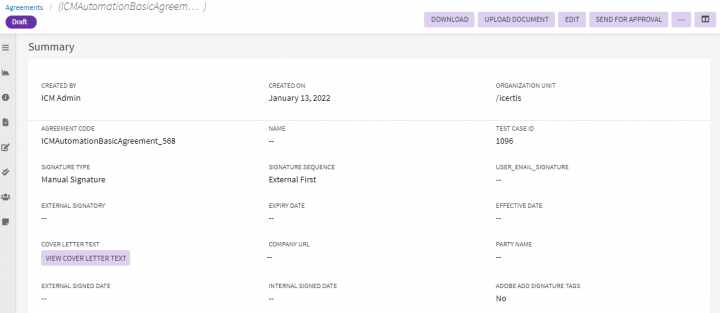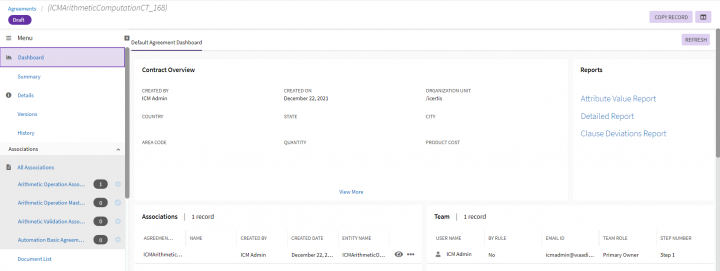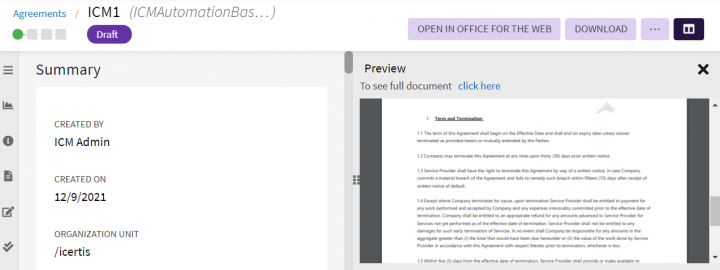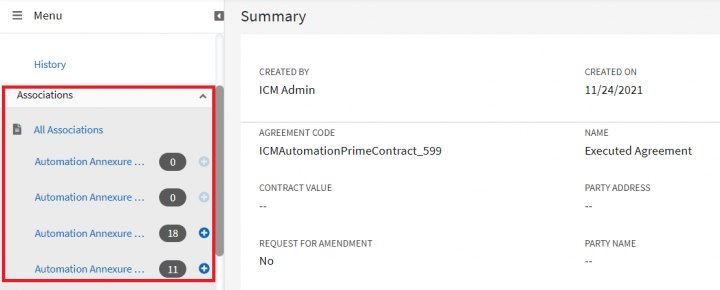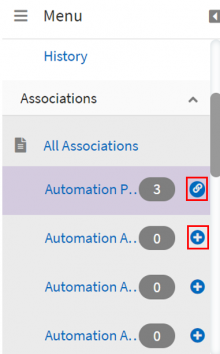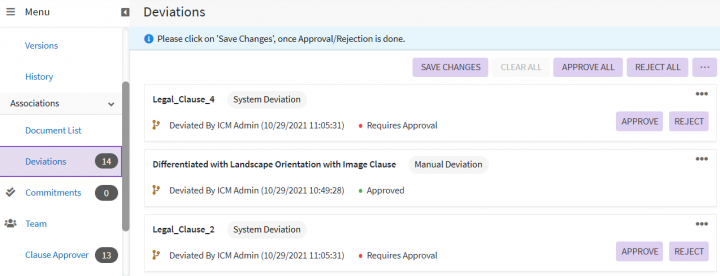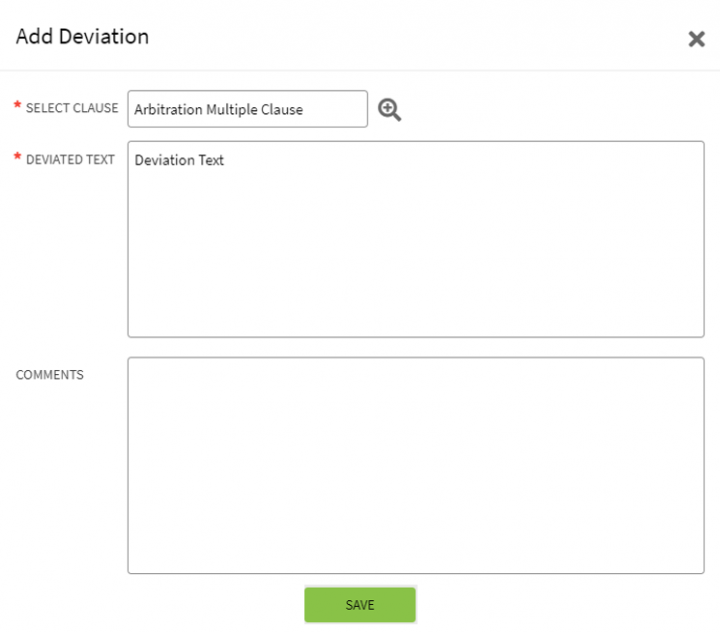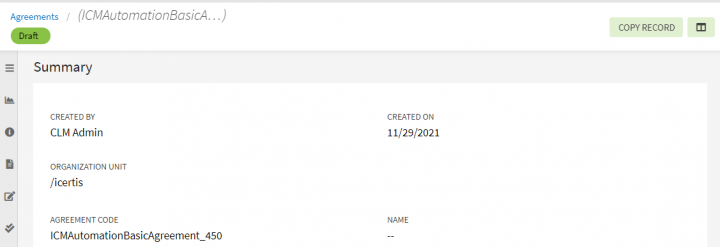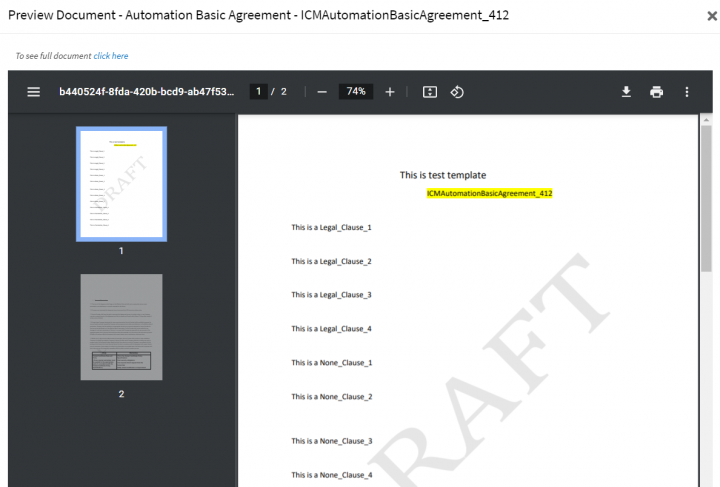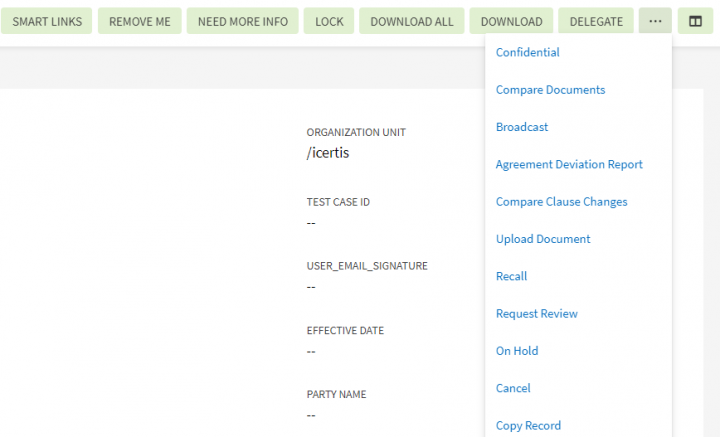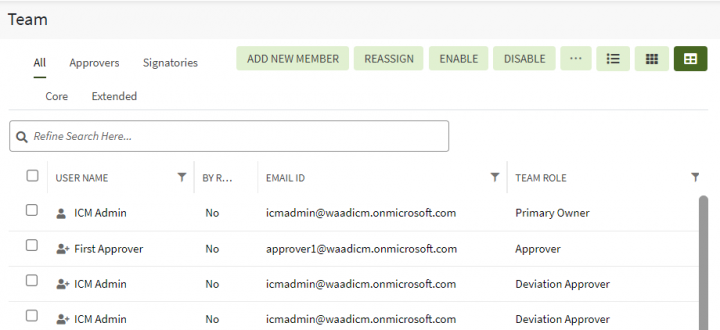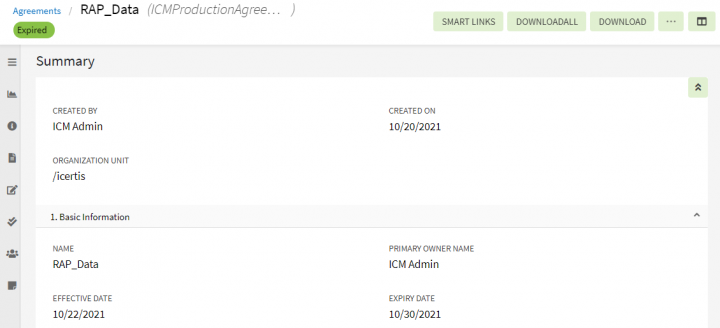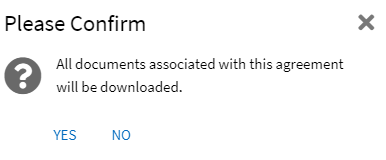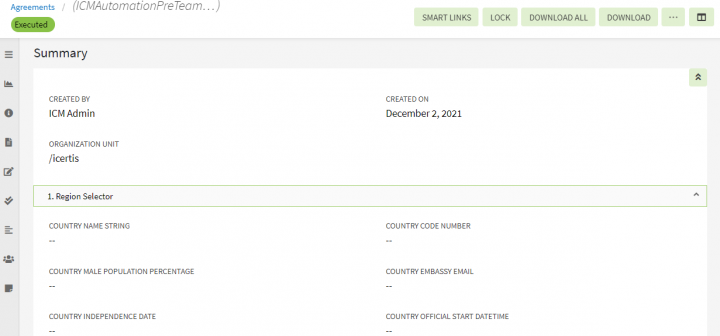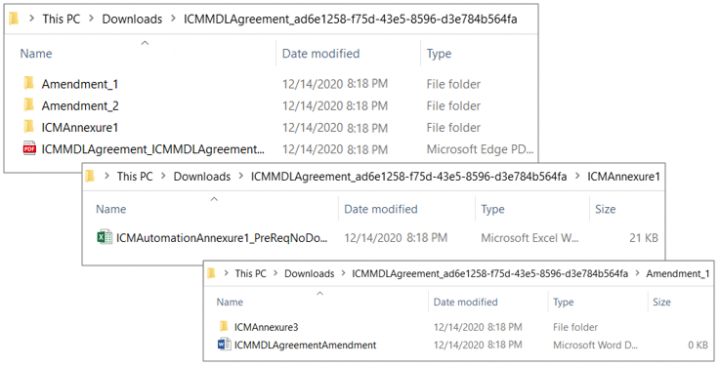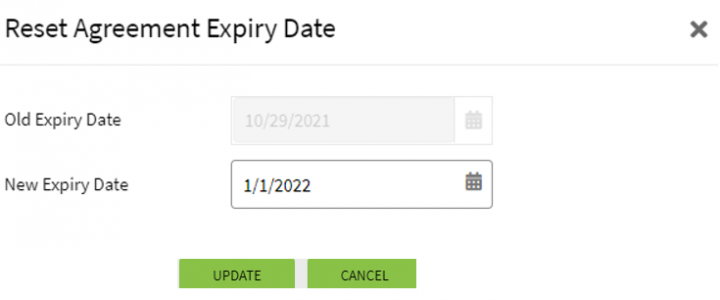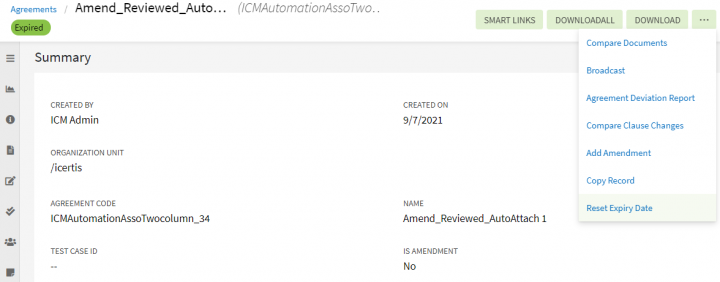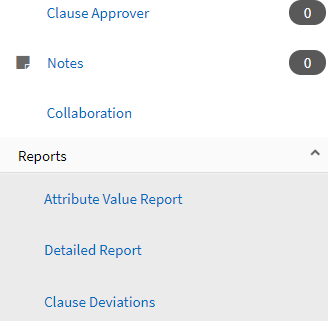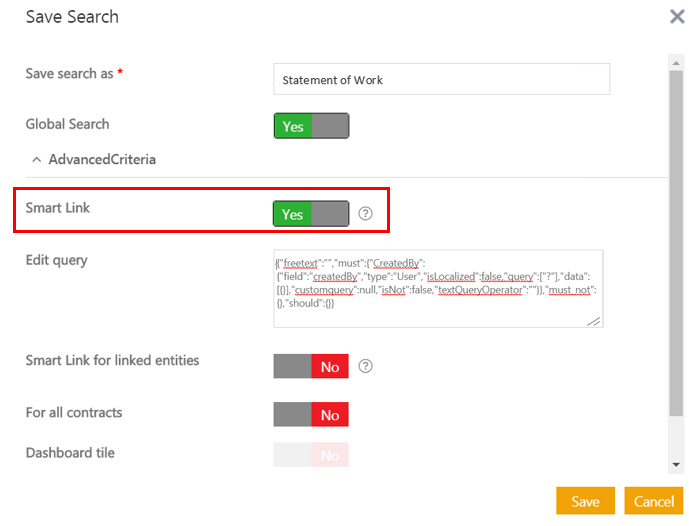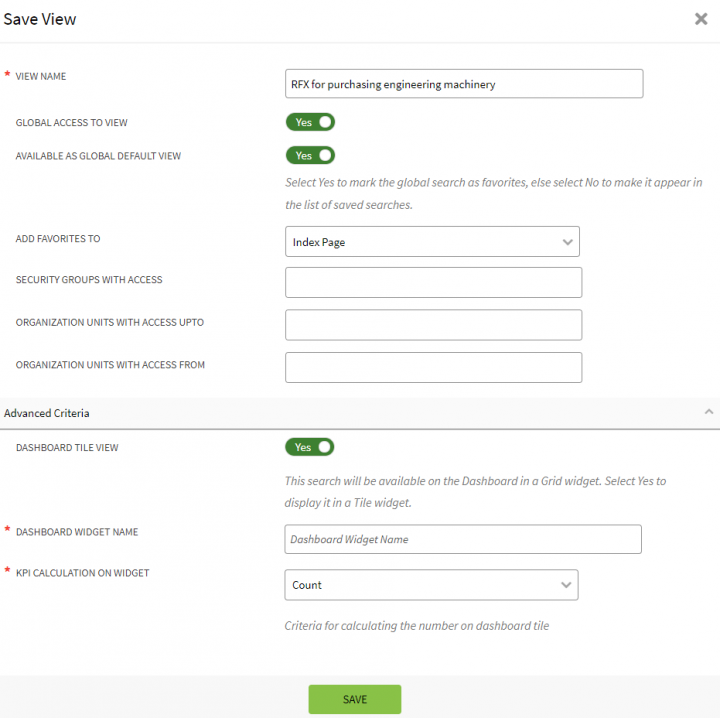Shefali DK (Talk | contribs) |
Shefali DK (Talk | contribs) |
||
| Line 96: | Line 96: | ||
Shows the entire life cycle of the agreement till now. Refer [[History|History]] page for more details on the History tab. | Shows the entire life cycle of the agreement till now. Refer [[History|History]] page for more details on the History tab. | ||
| − | |||
| − | |||
| | ||
| Line 125: | Line 123: | ||
| | ||
| − | |||
=== Deviations === | === Deviations === | ||
| Line 132: | Line 129: | ||
You can add deviation approvers directly from the Deviations section by clicking the Deviation Approver icon. This eliminates the need to navigate to the Team tab to add the Deviation Approvers. | You can add deviation approvers directly from the Deviations section by clicking the Deviation Approver icon. This eliminates the need to navigate to the Team tab to add the Deviation Approvers. | ||
| − | <div class="image-green-border"> </div> | + | <div class="image-green-border"> </div> |
| − | + | ||
| − | + | ||
| − | + | ||
=== Addition of action buttons on the Deviations tab === | === Addition of action buttons on the Deviations tab === | ||
| Line 150: | Line 144: | ||
1. '''Click''' the "View Details" icon on the "Agreements" page. The "Details" page opens. | 1. '''Click''' the "View Details" icon on the "Agreements" page. The "Details" page opens. | ||
| − | 2. '''Click '''the Deviations | + | 2. '''Click '''the "Deviations" tab in the left navigation pane that is collapsible horizontally. |
3. '''Click '''the plus icon next to Add Deviation to manually add deviations to the agreement’s clauses. The Add Deviation window opens. | 3. '''Click '''the plus icon next to Add Deviation to manually add deviations to the agreement’s clauses. The Add Deviation window opens. | ||
| − | + | | |
<div class="note-box">'''Note: '''To automatically add deviations, you have to download the agreement, modify the clauses and upload the agreement in ICI. To deviate a clause, the Deviation Analysis attribute should be set to Yes when creating the clause from the Create Clause page of Clause Management.</div> | <div class="note-box">'''Note: '''To automatically add deviations, you have to download the agreement, modify the clauses and upload the agreement in ICI. To deviate a clause, the Deviation Analysis attribute should be set to Yes when creating the clause from the Create Clause page of Clause Management.</div> | ||
[[File:8.0-Agreement Details Page5.PNG|720px|8.0-Agreement Details Page5.PNG]] | [[File:8.0-Agreement Details Page5.PNG|720px|8.0-Agreement Details Page5.PNG]] | ||
Revision as of 15:34, 18 January 2022
Contents
Agreement Details Page
You can see the current status and all the information related to the Agreement in various sections on the left navigation on the Agreement Details page. You can also perform various actions depending upon your role and the state of the Agreement.
To navigate to the Agreement Details page:
1. Click "Agreements" on the main navigation menu on the top.
The "Agreements" Index page opens listing all agreements.
2. Click the eye icon on the far right in the Actions column corresponding to the Agreement you want to view the details. The "Agreements" Details page opens.
Title Bar
The Agreement Details page has a title bar with breadcrumbs and the name of the agreement and agreement code on the left. On the right in the title bar, different action buttons are displayed such as "Smart Links", "Download" and so on. If there are more action buttons then those are visible under the three dots. On the extreme right, an option to "Split View" to preview the Agreement is provided.
The status of the agreement like "Draft", "Waiting for Approval", "Approved", "Executed" and so on is displayed below the title on the left.
Below the title bar, the Agreement has a collapsible left navigation pane. The left pane is in a collapsed state by default and can be expanded by clicking the hamburger icon of "Expand Menu" on top.
Here are the details you can see when you click on different sections in the left pane:
Dashboard
ICI has introduced a new feature dedicated to viewing Agreements in a better and more streamlined manner – “Agreement Dashboard”. It is the first menu or tab configured in the agreement details left navigation pane.
Here are the key aspects of the Dashboards menu:
- When the Dashboards menu is clicked, the agreement dashboards are displayed on the right.
- Agreement Dashboard can be configured to be the landing page for users by an admin.
- The default dashboard displayed on clicking “Dashboards” is the core seeded dashboard that comes with ICI.
- Multiple agreement dashboards can be configured for Agreement entity or contract type and role, and are displayed in tabs.
- Multiple tiles or widgets are displayed, based on configuration by the admin. On clicking “View More” each widget is directed to the respective tab displayed on the left pane of the Agreement details page eventually displaying the respective page. For example, the "Contract Overview": This widget displays the details of the agreement like “CREATED BY”, “CREATED ON”, “AGREEMENT CODE” etc. The “View More” link is provided to navigate to the agreement “Details” page.
- The count of the records under each widget is displayed beside the widget name separated with a "|" . For example, Associations | 1 record.
Standard user preferences-based settings apply to the agreement dashboard as well, for example, “View More” opening in the same or new tab or setting widget text colors.
Summary
- The sub-title "Summary" is displayed below the title bar on the left.
- The collapsible left navigation pane with different tabs is present to the left of the Summary.
- On clicking “Split View” on the extreme right in the title bar, a collapsible “Preview” pane appears on the right of the Summary.
- The "click here" link is at the top of the preview to download the full document in PDF format.
- Attribute’s summary will be displayed in multiple column layouts and the number of columns displayed varies based on the screen area available after expanding both the left pane and preview pane (Split View).
- Users can scroll the middle summary section separately from the left and right pane.
- The preview pane opens with a default width of 40% and closes on collapsing.
- Users can drag and maximize /minimize the preview manually with a minimum of 30% and a maximum of 70%.
Refer to "Previewing an Agreement" for more details on Preview.
The screenshot below shows the Summary with both the left pane and preview in expanded mode.
- Each column of data has the attribute label (in uppercase) on the top line and the value displayed below the label. The attributes with no value are denoted by two dashes.
- The mandatory attributes like Agreement "Created By" and "Created ON" will be displayed on the top-most section.
- The top-most section of the summary also includes the attributes like "Parent Record" showing parent-child linkage and the Contract Request–Contract link.
- Below the top-most section, the attributes are grouped under headings like "Basic Information", "Region Selector" and so on that can be collapsed and expanded individually or all at the same time using the Collapse/Expand all button at the top right.
Note: User will not be able to see the attribute groups for which access is not enabled from Attribute group privileges.
- You can view the Rich Text Area and download the "File Type". For example to view "Cover Letter Text" click "View" and click the download icon to download the "Contract Document".
- Attributes like "Delegate Email Addresses" supporting multiple emails will show only the first email, and a count of others will be present along with it. On hover, a tooltip will reveal all email ids.
- The static messages such as “Locked By”, Template/File not available, Restricted Document Assembly, and so on will be present as information messages below the agreement title.
Details
- Details: show the attributes of the Agreement along with the rich text area. Only the Primary Owner can edit the values of these attributes. Note, if the Primary Owner is replaced within the Team, the Primary Owner Name and Primary Owner Email fields will get updated with the current information.
Versions
History
Shows the entire life cycle of the agreement till now. Refer History page for more details on the History tab.
Associations
The "Associations" tab has all associations listed that belong to the Contract Type. For example "ICMAutomationBasicAgreement" Contract Type.
Click on the "All Associations" under the "Associations" tab in the left pane. The "All" tab is selected by default and all Associations including Peer, Parent-child, and so on will be displayed in a grid view on the right pane. Four separate tabs displaying the specific categories of associations can be viewed, For example, peer associations will be displayed under the "Peer" tab.
The grid view is similar to the Agreement index page grid with the collapsible "Refine View" pane on the filter for filtering grid view records. The action buttons "Refresh", "Select Columns" and "Export" are on the top right. The actions configured for the specific document are displayed under the three dots (...) actions column in the right. For example, "Preview Document", "View Smart Links", "Disassociate", "Inherit".
To view individual Association:
1. Expand the left pane by clicking on Expand Menu if the pane is collapsed.
2. Click on the individual association and the details will be displayed in the right pane in a grid view. The grid is similar to the agreement index page view with the "Save View" and "More Views" options. If the action buttons on the top right of the grid are more, they are displayed under three dots, in the end, For example, actions like "Export", Upload Template", "Download Template", "Configure Attributes". You can filter the records using the filter icon in the top left.
You can also add Associated Documents instances with a simple drag-and-drop action. For this, click the specific Associated Document under the Associations tab. This displays the drop zone if it is configured to be displayed. Drag-and-drop multiple files into the drop area provided. The name of the resulting Associations will display the file name.
This option is available only for the Associated Documents which are created using the specific Associated Document Contract Type:
- that has the Show File Drop Zone field set as Yes, and
- that does not contain any mandatory fields other than Name.
Associated Documents created using this Contract Type will have this feature enabled.
Deviations
Deviations allow you to add any changes to the Clauses. This may require the Agreement to be sent to the Deviation Approver for review and approvals.
You can add deviation approvers directly from the Deviations section by clicking the Deviation Approver icon. This eliminates the need to navigate to the Team tab to add the Deviation Approvers.
Addition of action buttons on the Deviations tab
The "Approve All", "Reject All" and "Clear All" buttons have been added on the Deviations tab of the agreement Details page to approve, reject or clear all deviations.
This makes it easier for the user to take actions on multiple deviations of the agreement in one go, considerably reducing the effort of approving, rejecting or clearing each one individually. You can approve or reject the individual clause with "Approve" and "Reject" provided at the right of each deviation.
Deviated Clauses
To view or add deviations for clauses:
1. Click the "View Details" icon on the "Agreements" page. The "Details" page opens.
2. Click the "Deviations" tab in the left navigation pane that is collapsible horizontally.
3. Click the plus icon next to Add Deviation to manually add deviations to the agreement’s clauses. The Add Deviation window opens.
- Click the search icon to select and add the deviated clause.
- Enter the text for the deviated clause.
- Enter your comments for the deviated clause.
- Click Save.
4. Click the plus icon next to Deviation Approver to manually add approvers for your deviated clauses.
5. Click the Send for Approval button.
- Click the three dots icon to view the comments provided by other users in the team or other stakeholders.
- Click the three dots icon to open the Deviation Details window. It displays the standard clause text, the deviated clause text and the comments provided by other users. You can add your own comments too.
- Click "Remove Deviation" to remove a deviation.
Note:
- Only deviations that are added manually can be removed. If deviations have been added by downloading the agreement and then uploading the agreement back to ICI, those deviations cannot be removed.
- Deviation approvers can also be added by defining rules from the Rules page.
- The Primary owner can send the reviewed agreement to the Deviation Approver. As a Deviation Approver, you can approve or reject clauses inside the agreement if a Deviation Approver role is assigned to you.
6. Clicking the Send for Approval button in Step 5 enables the Approve, Reject, Approve All, Reject All and Save Changes buttons. The Clear All button will be enabled when an action is taken on any deviated clause. Only the Deviation Approver can view these buttons.
- Approve: Click to approve each individual clause.
- Reject: Click to reject each individual clause.
Clicking the Approve and Reject buttons opens the Deviation Details window, displaying the details of the clause. You can also put in your comments in the Comments box. You do not have to click Save Changes to save your comments; they will be saved automatically.
- To approve or reject deviations in one go, click the Approve All or Reject All button.
In the above example, as we have already selected one clause for approval and one clause for rejection, clicking Approve All or Reject All will select the remaining 2 clauses (i.e. clauses that are not already selected). You can also add a common comment for the clauses. Comments will not be saved until you click the Save Changes button.
- Clear All: Clears all selections.
- Click Save Changes to save your changes.
The clauses that have been approved will have the status Approved, whereas the ones that have been rejected or no actions have been taken will have the status Requires Approval. 
Amendments: allow you to make changes to an Executed/Expired/terminated Agreements. This section will be blank if there are no Amendments made to the Agreement. The Amendments count on the left navigation pane indicates the number of amendments made to the base agreement.
Clicking on the Amendments in left navigation pane displays all the amendments of an agreement in a grid view. Users can toggle and view amendments in a tile view using the Grid view and Tile View icons.
Agreement Clauses: displays the clauses that have been defined for this Agreement. These include Rule-based Clauses. The tab provides the details of clause’s metadata as well as clause extension attributes, if Extended Clause Masterdata configuration is enabled in ICI.
You can also Replace a User through the Team tab.
Notes: displays the comments added for the Agreement. See Notes for more details.
You can perform the following actions from an Agreement Details page:
- Preview uploaded documents using the View icon corresponding to the file names on the Details page. The preview is available for documents in .docx, .pdf, .ppt, .pptx, .msg and Images (.jpg, .jpeg, .png and .gif) and .xlsx file formats. For example, preview the Power Point document (.ppt) uploaded in Attribute Other Document.
- Use Smart Links: to see any documents related to the selected Agreement.
- Edit: an Agreement to update any information which was either not provided or was not correct. You can preview uploaded .docx, .pdf, .ppt, .pptx, .msg and Images (.jpg, .jpeg, .png and .gif) and .xlsx documents on Edit Agreement page using the View Record icon provided next to the file name for a quick review. After editing, click Update and Publish so that all the team members can view the updated Agreement.
- Compare the changes made between any two available Agreement Document versions.
To view and download the redlined document of the selected agreement versions:
1. Click the Compare Document icon. The "Compare Documents" window opens.
2. Select the two versions that you want to compare.
3.Click the Compare Documents button. A preview of the redline version is displayed.
The comparison preview will display clause text and clause comments with their revisions for all static and rule based clauses which are tagged and assembled in an agreement.
- Send: the Agreement to various users within ICI.
- Send For Approval: sends the Agreement for approval to the assigned team. Before sending the Agreement for approval, select specific Associated Documents that need to be approved with the Agreement. This helps the Approvers to review and approve only the required Associated Documents instead of going through the entire list. Click Send For Approval. This opens Please select document(s) for approver review dialog box. Click Submit after selecting the required Associated Documents.
- Copy the existing Agreement. This option with be shown only if the Agreement is in the approved state.
- Upload Signed Copy: Upload Signed Copy button will be available to Contract Admin and Primary as well as Secondary Owners , so they can scan an upload an Agreement manually signed by the Internal Signatory and proceed with the Workflow. The button will be available only when the Agreement is in Waiting for Internal Signatory state.
- Upload Document
- Cancel
- Download document. You can continue with the Agreement workflow seamlessly after a document has been downloaded. After downloading the document, you will be able to handle the:
- Workflow changes when a document is recalled
- Removal of an Agreement from Adobe Sign during recall
- Call back when a document is signed or rejected
- Workflow movement when a document is signed or rejected
- Confidential
- Download All: You can download an Agreement with all Associated Documents attached to it.
Follow these steps to download an Agreement:
1. Click "Agreements" on the "Home" page. The Agreements index page opens.
2. Click View Details" icon next to the Agreement you would like to download.
3. Click Download All. This opens the dialog box with a message that all Associated Documents with this Agreement will be downloaded.
4. Click Download. Only the Agreement will be download.
When downloading a file in ICI, users can retain the original file name for any entity when uploading it to ICI, making it easier for users to identify and manage them. This is achieved through a technical configuration.
This is applicable to agreements, amendments, associations and file attributes in agreements/associations.
Users can download all associated documents together throughout the agreement and amendment lifecycle including the expired state. Users can also download agreement’s amendments with corresponding parent-child associations through the Download All action.
To download all associations and amendments of the agreement in expired state:
1. Click "Agreements" on the Home page. The agreement index page opens.
2. Click View Record icon next to the agreement you want to download. For example, MDL Agreement. The agreement Details page opens.
3. Click Download All. The Download window opens.
4. Select Associations, Amendments and amendment associations you want to download. The "Please Confirm" window opens.
You can preview documents on Download window using the View Document icon corresponding to a document. The preview is available for documents in .docx, .pdf, .ppt, .pptx, .msg and Images (.jpg, .jpeg, .png and .gif), .xls and .xlsx file formats.
The Download window for selective download can be enabled through technical configuration for the specific ICI instance.
The Download All action will download all the components of an agreement (base agreement, agreement’s peer and parent-child associations, amendments and amendment parent-child associations) when the selective download is disabled.
5. Click Download All. The selected associations with the agreement are downloaded in a zip file on the agreement Details page.
The system will download the base agreement, and each selected Association, Amendment with selected amendment parent-child associations in separate folders.
For example, selected Annexure1 Association is downloaded in ICMAnnexture1 folder and selected Amendments ICMMDLAgreementAmednment_11 and ICMMDLAgreementAmednment_12 are downloaded with corresponding selected associations in folders named Amendment_1 and Amendment_2.
Reset the Expiry Date of the agreement and amendment
User can reset the expiry date of the expired agreement and amendments as per the business need.
To reset the expiry date of the agreement:
1. Click "Agreements" on the "Home" page. The agreement index page opens.
2. Click View Record icon next to the agreement you want to open. The agreement Details page opens. For example, MDL Agreement.
3. Click Reset Expiry Date. The Reset Agreement Expiry Date window opens.
4. Enter the date in New Expiry Date field. For example, July 11, 2020.
5. Click Update. The agreement will move back to the previous state if the expiry date is set to future date.
Assigning Executed Agreements: ICIs additional workflow state allows you to assign the executed Agreements to other parties with updated metadata, in order to fulfil obligations and responsibilities, depending on the business requirements. The assignment Agreement goes through the workflow of approval and execution processes, and then supersedes the parent Agreement attributes as configured. Thus, the parent Agreement gets assigned to the new parties on the assignment date.
Terminating Executed Agreements: ICIs additional workflow state allows you to terminate executed Agreements.This is useful in business scenarios where an executed Agreement can be terminated only after executing a termination Agreement for it. The termination Agreement goes through the workflow of approval and execution processes, and then supersedes the parent Agreement attributes including the termination date as per the configuration. Thus, the parent agreement gets terminated on that termination date.
Reports: this section shows reports that are agreement specific and provide information that you are authorized to view. You can select filters and based on the permutation and combinations of the applied filter, the appropriate columns are displayed.
The following reports are accessible on this page:
- Clause Deviations
- Association Report
- Attribute Value Report
An error message is displayed if no results are generated or in case an incorrect filter is applied. You should be able to export the report into Excel, CSV or PDF. You can also schedule an email to be triggered when the report is generated.
To learn more about these reports, go to the Agreement Details Page Reports page.
All other reports can be viewed on various tabs of the Reports tile. To view other reports, go to the Reports Overview page.
ICI Business Applications and Implementation Teams can to set smart link as a means of easy navigation across related entities.
Configurators can:
- Configure a smart link across any ICI entity that defines the entity relationships
- Set the configured smart link in the left navigation pane and control its access privileges using ICI standard left pane configuration capabilities
Users can:
- Click on the left navigation link from an agreement contract type that will render the smart link result in grid
- Access existing ICI grid’s capabilities such as searching, sorting, filtering or exporting results as CSV/Excel for Smart Link results
Any changes made to the smart link configuration, will reflect in any subsequent smart link results rendered from the left navigation pane. The filter/search will also work for the right pane grid.
The smart link configured for left pane through saved search settings will only be available on the left navigation pane and will not appear in the 3 dots select action drop down and under Smart links icon on Entity Details page.
Let’s consider an example of entities related in multi-level hierarchy as Agreement > Obligations > Fulfillments. Earlier users had to navigate through obligations in order to access the child fulfillments. Users can now navigate directly from parent agreement to grandchild fulfillments using the smart link added to the agreement’s left navigation pane, thus saving number of clicks and page loads, and improving efficiency.
Defining the relationship between entities using common attributes
Users can define the relationship between any non related ICI entities using their common attributes by creating a smart link. Users can then add this link to the contract type’s left navigation pane for easy navigation to the linked entities.
To create a Saved Search:
3. Apply the filters and keywords to fine tune the search result you want.
4. Click Save Search icon. The Save Search window opens.
6. Toggle the Global Search to Yes.
7. Click AdvancedCriteria. The advanced criteria section expands.
8. Toggle the Smart Link to Yes to set up a smart link. More fields show up to set the smart link properties.
9. Edit the query for the search criteria as required in Edit query field. To edit the query, replace the text in the [] brackets in the query with “?”.
10. Toggle the Smart Link for linked entities to Yes. This creates the smart link to the selected entity in the search, in this case, entityStatement of Work. More fields show up to set this smart link properties.
12. Select the contract type in the Linked entity field. The linked entity drop-down displays all contract types available in the ICI. For example, select Master Services Agreement.
This field lets you link the selected entity with any other ICI contract type if they have common attributes. In this case, attribute Created By.
14. Select the contract type in the Parent contracts field. For example, select Statement of Work.
15. Toggle the Show on left pane to Yes. This will mark the configured smart link to be displayed on the left navigation pane of the selected contract type in the Linked entity or Parent contracts fields.
16. Toggle For all contracts to Yes/No as required.
17. Click Save. The smart link is created.
The configured smart link in the saved search is then enabled on the selected contract type’s left navigation pane through technical configuration. The smart link can be added at any location on the left navigation pane on the entity details page. For Associations pane, configured smart link can be added either above or below All link, just before the individual associations links are displayed.
For example, Statement of Work saved search created for Statement of Work contract type, is added as smart link to the Master Services Agreement on the left navigation pane.
Related Topics: Agreement Details Page Reports | Association Management | Adding Associations | Reports | Versions | History | Notes


